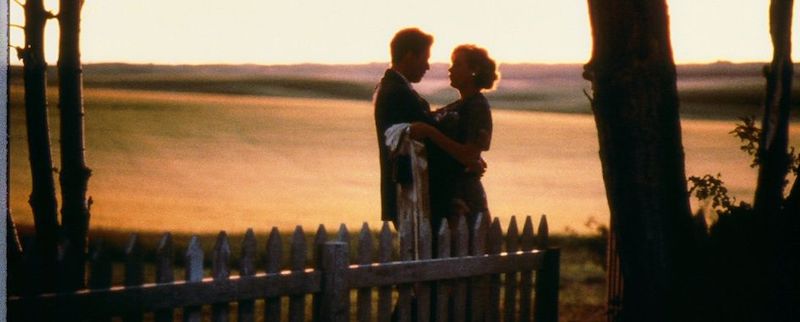Bye Bye Blues
|
Canada, 1989 (fiction, 110 minutes, couleurs, anglais)
|

|
| Image : © Mongrel Media |
Description du film [en anglais] :
« In this critically acclaimed feature drama, Daisy returns home to Alberta from India at the start of World War II. There she learns her husband has been captured by the Japanese. To make ends meet, she joins a dance band as a singer, only to be faced with a multitude of personal dilemmas. »
-- National Film Board of Canada
(source)
|
| Générique (partiel) : |
| Scénario : | Anne Wheeler |
| Produit par : |
Tony Allard, Arvi Liimatainen, Anne Wheeler |
| Interprètes principaux : |
Rebecca Jenkins, Luke Reilly, Stuart Margolin, Wayne Robson, Robyn
Stevan, Michael Ontkean, Kate Reid, Chad Krowchuk, Kirk Duffee, Vincent
Gale, Leslie Yeo, Sheila Moore |
| Images : |
Vic Sarin |
| Montage images : |
Christopher Tate |
| Musique : |
George Blondheim |
| Société de production : |
Allarcom, True Blue Films,
Artificial Eye, Telefilm Canada |
(sources)
Prix décernés à Bye Bye Blues
- Prix Génie : Meilleure interprétation féminine dans un premier rôle -- décerné à Rebecca Jenkins
- Prix Génie : Meilleure interprétation féminine dans un rôle de soutien -- décerné à Robyn Stevan
- Prix Génie : Meilleure chanson originale -- décerné à Bill Henderson
Notes sur Bye Bye Blues
- Nominé pour un Prix Génie dans la catégorie Meilleur réalisateur.
(sources)
Citation sur Bye Bye Blues
« Il faut savoir gré à l'auteure d'avoir pu
dépeindre avec une telle finesse (jeux de regards, gestes ébauchés) les
déchirements intérieurs de Daisy, sa mélancolie profonde cachée derrière
un sourire, ses désirs amoureux, sa délicatesse dans ses relations avec
ceux qui l'entourent (enfants, parents, collègues, amis) ce qui n'exclut pas de poser à l'occasion des gestes décisifs. Il est indéniable que l'oeuvre est animée par une sensibilité féministe, mais Anne Wheeler est assez intelligente pour ne pas imposer les schèmes des années 80 sur des
personnages des années 40. »
-- Robert-Claude Bérubé
(source)
Citations sur Bye Bye Blues [en anglais]
« The core conflict is within Daisy herself, rooted in her transformation from
pampered, passive doctor's wife to hard-working single mother and
swing-band diva. »
-- Kathleen Cummins
(source)
« Bye Bye Blues recovers an element of Canadian women's
history not represented in any other Canadian feature film, the challenges
and temporary opportunities presented to Canadian women by the Second
World War. »
-- Christopher E. Gittings
(source)
« Rowley [Alberta] had almost become a ghost town after the closure of the Canadian National Railway line years before. The station still existed, along with three grain elevators and a 1940s-style main street, which then served a population of sixteen. There were many vacant buildings and a service station still equipped with the old-style glass reservoir gasoline pumps. [Bye Bye Blues] production designer John Blackie brought the town back to life with alterations, additions, and paint. [...]. »
-- Bill Marsden
(source)
« [Anne] Wheeler mingles bits and pieces of Hollywood with a modern Canadian sensibility to come up with a film that is steeped in the romantic side of wartime nostalgia without being pat or predicable. Accented by gorgeous shots of the roiling Alberta landscape, you can feel Wheeler's love for the land though the lens. »
-- Katherine Monk
(source)
« India is coded by the film [Bye Bye Blues] as the colonial experience immersed in sexuality and sensuality (beautiful, enigmatic Indian men and women, kindly native servants, love-making on silk sheets with drifting white mosquito nets, and so on); Canada, on the other hand, is the land of denial where the reality principle reigns (the infinite flatness of the prairies, autumnal colours, sexual frustration and rural morality). »
-- Michael O'Pray
(source)
Bibliographie sur Bye Bye Blues
Brèves parties de livres
-
GITTINGS, Christopher E. Canadian National Cinema: Ideology, Difference and Representation, London, Routledge, 2002.
[en anglais] (pp. 275-276)
-
MARSDEN, Bill. Big Screen Country: Making Movies in Alberta; A Memoir, Calgary, Fifth House, 2004.
[en anglais] (pp. 137-139)
-
MONK, Katherine. Weird Sex and Snowshoes: And Other Canadian Film Phenomena, Vancouver, Raincoast Books, 2001.
[en anglais] (p. 279)
-
THERRIEN, Denyse. « Petit à petit, le cinéma des prairies fait son nid »
,
dans À la recherche d'une identité : renaissance du cinéma d'auteur
canadien-anglais, sous la direction de Pierre Véronneau, Montréal, Cinémathèque québécoise/Musée du cinéma, 1991.
(pp. 149-154)
Articles de journaux, de revues grand public ou de sites d'information en ligne
-
BÉRUBÉ, Robert-Claude. « Bye Bye Blues », critique de Bye Bye Blues, Séquences, juin 1990.
-
HEUNG, Marina. « Bye Bye Blues », critique de Bye Bye Blues, New Directions for Women, mai-juin 1991.
[en anglais]
-
LAFFEL, Jeff. « Bye Bye Blues », critique de Bye Bye Blues, Films in Review, décembre 1990.
[en anglais]
-
O'PRAY, Michael. « Bye Bye Blues », critique de Bye Bye Blues, Monthly Film Bulletin, octobre 1990.
[en anglais]
-
QUICK, Shelly. « Bye Bye Blues: An entertaining hybrid », critique de Bye Bye Blues, Kinesis, mars 1990.
[en anglais]
-
VARIETY. « Bye Bye Blues », critique de Bye Bye Blues, Variety, 6 septembre 1989.
[en anglais]
Sites Web sur Bye Bye Blues


